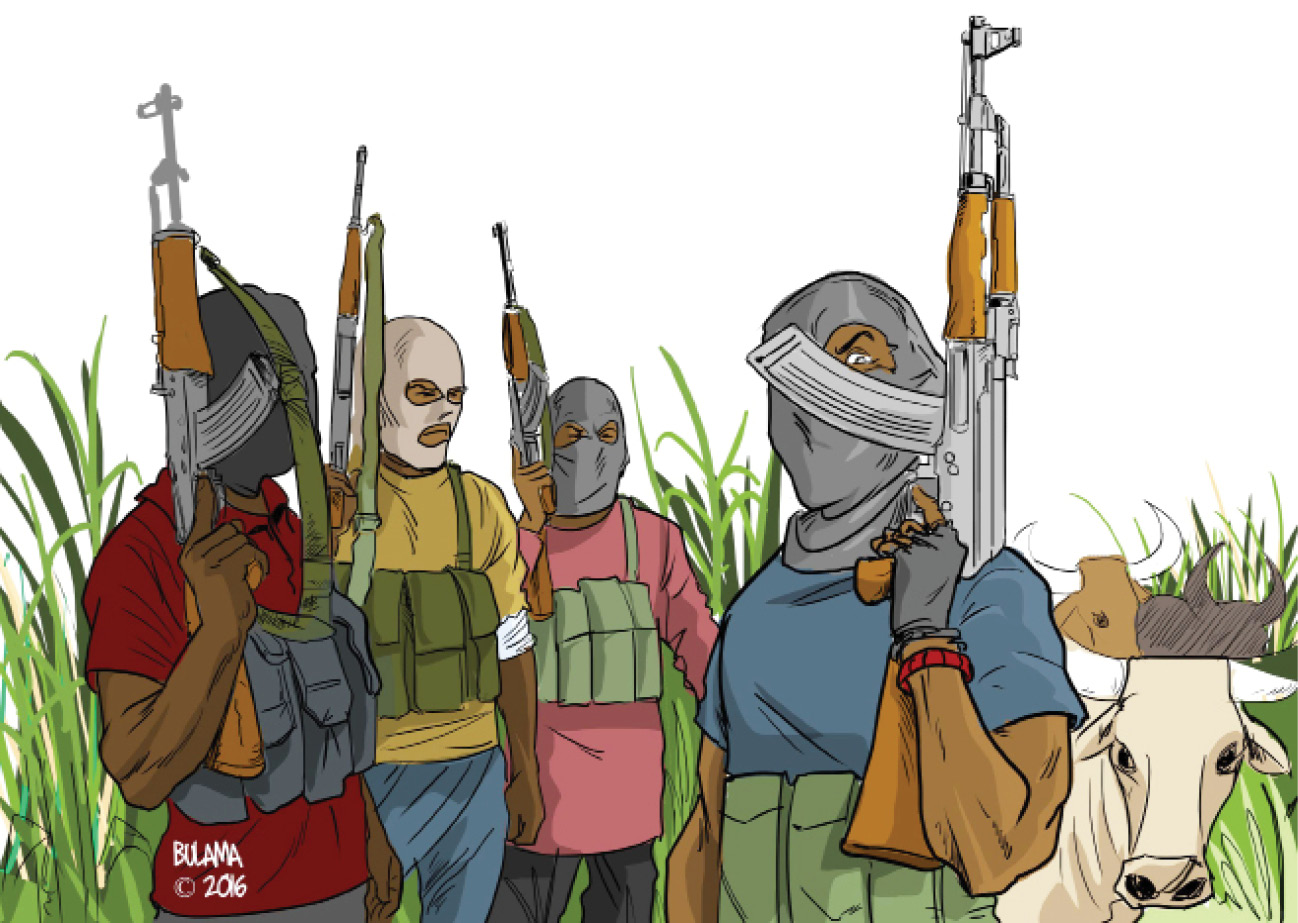Many times, I stumble upon arguments concerning banditry and the accompanying argument about the President’s actions and inaction. Many claim that President Muhammadu Buhari being a Fulani man is treating the issue and that of Boko Haram with kid gloves. Sometimes, I see some security analysts struggling so hard to situate the real situation within the context people would understand and they further mix things upside down and instead of laying out the complex issues surrounding banditry. Being a subject of personal interest, I would try to give a layman explanation of what banditry is, the causes, the course it has so far taken and the factors that have helped in exacerbating the issues.
Thus, for me, banditry refers to a destructive, violent activity perpetrated by groups of armed men bonded by a common resolve whose main purpose is centred around pecuniary acquisition. It is a phenomenon that has undergone a process of transformation over time from acts of minor crimes to full blown outright criminality which is characterised by armed robbery on highways, brutality, cattle rustling, village raiding, and kidnapping for ransom and hostage taking with damning implication on citizens.
- How Okagbare lashed Nigerian sports officials before receiving Doping hammer
- BREAKING: Nigeria’s D’Tigers fall to Italy, crash out of Olympics
Banditry is an offshoot of one of the worst forms of domestic conflict that transmuted from a resource-based conflict into a regional conflict that security practitioners have concluded is nothing but terrorism. The conflict in the region of north west of Nigeria has manifested itself in various dimensions taking off from farmers/herders’ conflict to petty robbery in rural areas to cattle rustling, highway robbery, village raid and finally kidnapping and abduction for ransom. Banditry is now a cancerous phenomenon that became so pervasive in the North West region of Nigeria.
It is important to understand that the issues surrounding what constitute banditry in the North West, differs significantly from what constitute banditry in the North Central and North East. While the dynamics of what constitute banditry partly borders on religious dichotomy and other factors, the factors in the north west are basically a fallout of intergroup relations
The interplay of farmers/herders relations and the resulting conflict dynamics is one of the baseline factors responsible for banditry. These dynamics are directly connected to ecological changes and climate induced pressures which have affected access to land and land resources resulting in agro-pastoral conflict between farmers and herders. The socio-cultural pattern of relationship between the Hausa agriculturists and Fulani pastoralistss have been described as the best ever compared to relationship between other ethnic groups in Nigeria. This relationship has in recent times deteriorated due to incessant crises between them that has now birthed several atrocities such as cattle rustling, attacks on villages, kidnapping, maiming, extra-judicial killings.
Furthermore, we cannot talk about banditry without Zamfara state, as it has always been a hotbed of such criminal activities for years. By 2011, the problem had escalated and was characterised by armed robbery, cattle rustling, kidnapping and massive village attacks resulting in the destruction of lives and properties.
Another is factor is government’s neglect and law enforcement’s inability to act swiftly. Other reasons are the direct effect of reactions against alleged and perceived socio-political and economic marginalization of Fulani by their Hausa counterparts arising from the alleged prolonged injustice which the herders claimed they were subjected to by corrupt police officers, village heads and judges. Studies also showed that the police, judges, district and village heads prefer dealing with cases involving the Fulani. In instances where herders became involved in litigations on account of their cattle trespassing on farms and destroying crops, they were made to pay heavy fines, often disproportional to damage caused making them lose most of their cattle. Over the years, the children of the dispossessed herders became available for hire as professional cattle herders for the Hausa, who have over time accumulated large herds of cattle often bought from hard pressed Fulani. This amounted to role reversal. Some of the young members of the Fulani communities became big-time armed robbers. Overtake of grazing reserves threw many herders out.
Around 2011, armed robbery, extortion of local wealthy people, raping of married women and the kidnappings by bandits became rampant and it triggered affected communities to organise local self-help groups in order to checkmate the activities of bandits. The groups virtually took over the duties of law enforcement agencies, imposing death sentences on known or suspected criminals and executing them. The Fulani communities also organised themselves into several groups known as Yan Bindiga acquired sophisicated weapons and carried out reprisal attacks on communities presumed to have participated in the killing of the Fulani/ bandits.
A breakdown in conflict management and resolution mechanism that was in place before and the inadequacies of governance and security apparatuses created more prospects for different criminal and terrorist groups to establish, expand and institutionalized their notorious industry across the North West region. The proliferation of arms, poverty, unemployment, drug abuse, unregulated and illegal gold mining and the vast forests that have served as a safe haven for criminals are other critical factors that have exacerbated banditry.
Thus, banditry is a complex, multilayered and hydra headed phenomenon that requires a multi-dimensional approach to resolve.
By Maryam Hamza, Ph.D, Dept of History and War Studies Nigerian Defence Academy, Kaduna

 Join Daily Trust WhatsApp Community For Quick Access To News and Happenings Around You.
Join Daily Trust WhatsApp Community For Quick Access To News and Happenings Around You.

